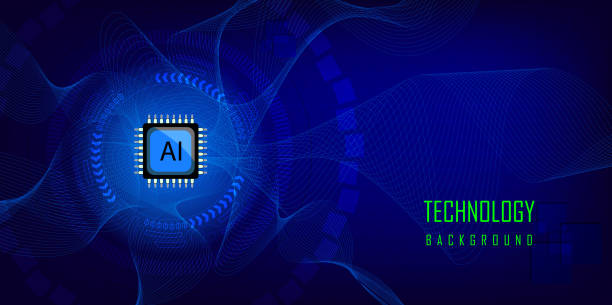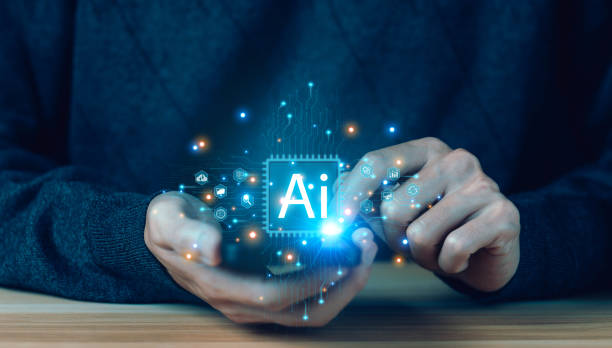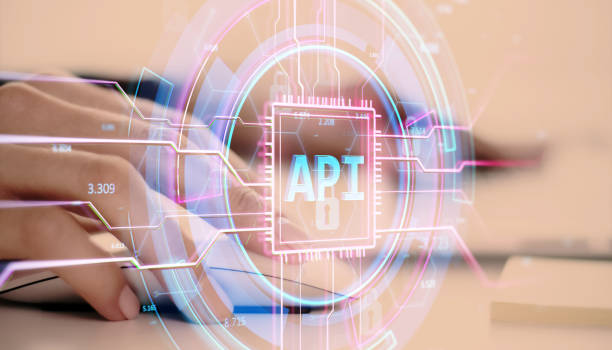An Introduction to Artificial Intelligence: Roots and Definitions
In today’s world, the name #ArtificialIntelligence (AI) is frequently heard and is no longer confined to science fiction films; rather, it has become a tangible reality in our daily lives.
This revolutionary technology, essentially defined as the simulation of human intelligence in machines, grants capabilities such as learning, reasoning, problem-solving, perception, and even language comprehension to computer systems.
The history of artificial intelligence dates back to ancient times and legends of intelligent artificial beings, but its scientific roots were laid in the mid-20th century with the advent of computers and the efforts of scientists like Alan Turing and John McCarthy.
The concept of the “Turing Test” as a criterion for measuring machine intelligence was one of the early foundations of this field.
The primary goal in designing these systems is to create machines that can perform cognitive tasks typically requiring human intelligence.
This includes abilities such as learning from data, recognizing patterns, making decisions, and responding to complex challenges.
Over time, AI transformed from a theoretical concept into a specialized and applied field encompassing various domains of computer science, robotics, psychology, and philosophy.
These advancements have paved the way for countless applications across diverse industries and continue to evolve rapidly.
Understanding the foundation of artificial intelligence is essential for grasping the profound transformations this technology is bringing to the world, and this section descriptively addresses this important topic.
Did you know that 94% of users’ first impression of a business is related to its website design? With professional corporate website design by **Rasawb**, turn this initial impression into an opportunity for growth.
✅ Attract more customers and increase sales
✅ Build credibility and trust in the eyes of your audience⚡ Get a free website design consultation!
Types of Artificial Intelligence: From Narrow AI to General AI
Artificial intelligence is generally divided into three main categories: Narrow AI, General AI, and Super AI.
#NarrowAI, also known as “weak AI,” is a type of artificial intelligence designed and trained only to perform a specific task.
Numerous examples of this type of AI can be seen in everyday life, from voice assistants like Siri and Alexa to recommendation systems like Netflix and Spotify, and also self-driving cars.
These systems are highly efficient in their specialized domain but cannot generalize their knowledge or abilities to other tasks.
This is the dominant form of AI currently, with the most widespread applications.
Next is General AI, or “strong AI,” which has not yet been fully developed.
This type of AI will be capable of performing any intellectual task a human can do.
In other words, General AI will possess the ability to learn, understand, reason, and interact at a human level, not just in a specific area.
Creating General AI is one of the biggest challenges facing AI researchers, and it seems we are still years away from achieving it.
Finally, Super AI refers to intelligence that surpasses human intelligence in all aspects, including creativity, problem-solving ability, and social skills.
Achieving this level of AI will have profound implications for humanity and is the subject of extensive philosophical and ethical debates.
Understanding these fundamental distinctions is crucial for grasping the current capabilities of AI as well as its future prospects, and this section specifically and descriptively covers these classifications.
Applications of Artificial Intelligence in Daily Life and Various Industries
#ArtificialIntelligence is no longer confined to laboratories; its penetration into daily life and various industries is undeniable.
From smartphones to cars and even in our homes, the footprint of AI is clearly visible.
One of the most tangible applications is smart voice assistants, which, through natural language processing, allow users to interact with their devices via voice commands.
In the health and medical sector, AI is used for early disease diagnosis, drug discovery, and even surgical robots.
Financial and banking systems utilize AI for fraud detection, risk management, and providing automated customer services.
In the automotive industry, the development of self-driving cars and advanced driver-assistance systems, relying on AI’s abilities to analyze sensor data and make real-time decisions, provides entertainment and guidance to users.
Even in the agricultural sector, AI helps optimize irrigation and monitor crop health.
To clarify the picture, let’s look at some examples of AI applications in various industries:
| Industry | AI Application | Practical Example |
|---|---|---|
| Health and Medicine | Disease Diagnosis, Drug Discovery | IBM Watson in cancer diagnosis, surgical robots |
| Financial Services | Fraud Detection, Risk Management | Suspicious transaction detection systems |
| Automotive | Self-driving Cars, Driver-assistance Systems | Tesla Autopilot, Waymo |
| E-commerce | Product Recommendation, Chatbots | Amazon, virtual support assistants |
These diverse applications demonstrate the immense potential of artificial intelligence in improving quality of life and increasing productivity across various industries.
#MachineLearning and #NaturalLanguageProcessing technologies are the backbone of many of these innovations, enabling AI to appear in our daily interactions in an entertaining yet guiding manner.
This section provides a comprehensive and educational overview of these applications.
Ethical and Social Challenges of Artificial Intelligence: Deep Reflections
Despite the remarkable advancements in #ArtificialIntelligence, numerous ethical and social challenges have also emerged, requiring deep reflection and discussion.
One of the most significant concerns is #algorithmicbias.
Since AI algorithms are trained on data collected by humans, if this data contains racial, gender, or social biases, AI will learn and reproduce these biases, which can lead to discrimination and injustice.
The debate surrounding data privacy is another vital issue.
AI systems require vast amounts of personal data to function, raising concerns about how this information is collected, stored, and used, thereby exacerbating security issues.
Click here to preview your posts with PRO themes ››
The impact of AI on the job market is also a questionable topic.
Although AI can create new jobs and increase efficiency, there are concerns about human jobs being replaced by machines, especially in service and manufacturing industries.
This can lead to increased inequality and a need for workforce retraining.
Furthermore, the issue of accountability for decisions made by AI is raised; for example, in the event of an accident involving a self-driving car, who bears the legal responsibility? The developer, the manufacturer, or the AI system itself? These are questions that require new legal and ethical frameworks.
The discussion about the potential of superintelligent AI and the ability to control it is also a longer-term concern.
This section analytically and provocatively addresses these deep challenges to provide a more comprehensive view of the complex dimensions of AI and to discuss our responsibility regarding the development of this technology.
Does your current corporate website present a worthy image of your brand and attract new customers?
If not, with Rasawb’s professional corporate website design services, turn this challenge into an opportunity.
✅ Significantly improves your brand’s credibility and image.
✅ Paves the way for attracting leads and new customers for you.
⚡ For a free and specialized consultation, contact Rasawb now!
The Future of Artificial Intelligence and Its Transformative Potentials
The future of #ArtificialIntelligence is more than a simple prediction; this field is rapidly becoming the main driving force behind major transformations in all aspects of human life.
AI’s transformative potentials are countless and can profoundly reshape society, the economy, and even the concept of work and life.
It is predicted that in the coming decades, AI will play a key role in solving humanity’s biggest challenges, including climate change, discovering treatments for incurable diseases, and ensuring food security.
Advancements in robotics and hybrid AI will lead to the creation of robots capable of performing complex tasks in dangerous environments or those requiring high precision, such as remote surgeries or space exploration.
One of the exciting aspects of the future is the coexistence and collaboration between AI and humans.
Instead of complete replacement, AI will serve as a powerful tool to augment human capabilities.
In medicine, AI helps doctors provide more accurate diagnoses and devise more personalized treatment plans.
In education, intelligent systems can tailor learning experiences to each student’s individual needs.
In industry, smart automation will lead to increased productivity and reduced human errors.
Furthermore, AI advancements are expected to continue towards the development of generative AI, such as more advanced large language models and creative content generation systems, which will provide new capabilities in artistic and media fields.
These developments not only promise a future full of innovation but also highlight the need for continuous adaptation to new technologies and the redefinition of human roles.
This section analytically and informatively outlines the future prospects of artificial intelligence.
The Role of Artificial Intelligence in Transforming Industries and Businesses
#ArtificialIntelligence has not only transformed our daily lives but is also creating a profound revolution in global industries and businesses.
This technology helps companies unprecedentedly increase their efficiency, optimize processes, and create new values for their customers.
In manufacturing, AI, through #robotics and #smartautomation, reduces human errors and significantly increases production speed.
Intelligent systems are capable of monitoring product quality and even predicting which machines require preventive maintenance, leading to reduced downtime and costs.
In customer service, AI-powered chatbots and virtual assistants respond to customer inquiries around the clock, improving user experience and relieving the workload of human employees.
These systems can automatically answer common questions or direct customers to the relevant departments.
Analysis of Big Data is another crucial application of artificial intelligence in business.
Intelligent systems can identify hidden patterns and trends in data, which helps companies in strategic decision-making, such as identifying new target markets, optimizing marketing campaigns, and predicting product demand.
This analytical capability provides a significant competitive advantage for companies.
Furthermore, AI is also applied in human resources, from resume screening to predicting job turnover and personalizing training programs.
In essence, AI has become an indispensable tool for companies seeking innovation, cost reduction, and increased customer satisfaction in today’s highly competitive world.
This section specifically and instructively examines the role of artificial intelligence in industrial and business transformations.
How to Acquire Skills in Artificial Intelligence: A Practical Guide
For those interested in entering the world of #ArtificialIntelligence and developing their skills in this exciting field, there are multiple paths.
This field is rapidly growing and requires specialists with strong technical knowledge and problem-solving skills.
The first step on this path is learning the fundamental principles of computer science and mathematics.
Understanding concepts such as linear algebra, calculus, statistics and probability, as well as data structures and algorithms, is essential for anyone who wants to become an expert in AI.
After that, focusing on relevant programming languages like Python and learning popular AI libraries such as TensorFlow and PyTorch becomes important.
Click here to preview your posts with PRO themes ››
The second step is to delve into #MachineLearning and #DeepLearning.
Online courses from platforms like Coursera, edX, and Udacity are excellent educational resources for acquiring these skills.
Undertaking practical projects and participating in AI competitions on platforms like Kaggle will help you translate your theoretical knowledge into practical experience.
Finally, specializing in one of AI’s subfields, such as natural language processing, computer vision, robotics, or #DataScience, can define your career path.
Networking with other professionals and following the latest news and advancements in this field are also essential for staying up-to-date.
For a practical guide, here are some key resources and tools for learning artificial intelligence:
| Category | Example / Description | Importance |
|---|---|---|
| Programming Languages | Python with libraries like NumPy, Pandas, Scikit-learn | Industry standard for AI development |
| Deep Learning Frameworks | TensorFlow, PyTorch, Keras | Powerful tools for building complex models |
| Online Courses | Coursera (Andrew Ng’s courses), edX, Udacity | Structured and comprehensive education |
| Competition Platforms | Kaggle | Opportunity to work on real data and gain experience |
| Theoretical Resources | Textbooks on statistics, linear algebra, machine learning | Strengthening scientific and mathematical foundations |
This section educationally and instructively outlines the practical steps for acquiring skills in the field of artificial intelligence.
Creativity and Artificial Intelligence: Can Machines Be Artists?
The question of whether #ArtificialIntelligence can truly be creative is one of the most controversial yet fascinating aspects of this technology.
For a long time, creativity has been considered a unique and inherent characteristic of human intelligence.
However, with the emergence of tools such as #AIArtGenerators, #automatedcomposers, and #LargeLanguageModels capable of writing stories and poetry, these boundaries are blurring.
How do these systems work? They learn patterns by analyzing vast amounts of existing data (images, music, texts) and then use these patterns to generate new content.
The results of their work sometimes appear surprisingly original and engaging, challenging the line between machine production and artistic innovation.
But does this signify true creativity? Some argue that AI merely “imitates” and lacks consciousness, emotions, or intention behind its works.
They believe that creativity requires lived experiences, a deep human understanding of the world, and the ability to break existing patterns and create something entirely novel, which AI has not yet achieved.
Conversely, others believe that the definition of creativity should not be limited to human mental processes, and if the output of an AI system is innovative and impactful, it can be considered a form of creativity.
These debates create thought-provoking content that helps us re-evaluate our understanding of intelligence and creativity.
The future will show how far artificial intelligence can advance in the realm of art and creativity, and whether machines will truly be capable of creating masterpieces that deeply engage human emotions, or if they will always remain tools in the hands of human artists.
This section entertainingly and provocatively addresses this complex debate.
Are you tired of your e-commerce site getting visitors but no sales? Rasawb solves your main problem with professional e-commerce website design services!
✅ Significant sales increase with targeted design
✅ Flawless user experience for your customers
⚡ Get a free consultation!
Latest News and Advancements in Artificial Intelligence: New Leaps
The world of #ArtificialIntelligence witnesses new advancements and leaps every day that shape the future path of this technology.
News in the field of AI spreads so rapidly that keeping up with it has become a continuous challenge.
One of the most important and influential recent advancements is the development of Large Language Models (LLMs), such as GPT-4 and similar models, which have demonstrated unprecedented capabilities in understanding, generating, and interacting with human language.
These models can not only analyze complex texts but are also capable of generating creative content, coding, answering complex questions, and even simulating human conversations.
These advancements have laid the groundwork for massive changes in areas such as content creation, customer support, education, and software development.
In addition to LLMs, significant advancements have occurred in the field of #ComputerVision.
AI systems can now analyze images and videos with extraordinary accuracy, detect objects and faces, and even reconstruct 3D scenes.
These capabilities play a crucial role in the development of self-driving cars, security systems, and medical diagnostics.
In the field of #GenerativeAI, we are witnessing the emergence of tools that can create images, music, and even videos from scratch, using only a text prompt.
This revolution in digital content has transformed creative industries.
Furthermore, research in AI for Science has made significant progress, where AI assists scientists in discovering new proteins, designing advanced materials, and even climate modeling.
These news items are not only exciting but also demonstrate the boundless potential of artificial intelligence to solve complex challenges and open new horizons in all aspects of human life.
This section informatively and analytically covers the latest developments in artificial intelligence.
Click here to preview your posts with PRO themes ››
Artificial Intelligence and the Future of Education: Redefining Learning
#ArtificialIntelligence has immense potential to fundamentally transform educational systems and can redefine learning and teaching methods in an unprecedented way.
Given AI’s personalization and data analysis capabilities, it can be expected that education in the future will become significantly more effective and tailored to the individual needs of each student.
One of the main applications of AI in education is adaptive learning systems.
These systems can identify each student’s learning style, progress speed, strengths, and weaknesses, and provide personalized educational content, exercises, and feedback.
This approach helps students be more motivated in their learning journey and gain a deeper understanding of the subjects.
Furthermore, #ArtificialIntelligence can automate repetitive and administrative tasks for teachers, such as grading exam papers, tracking student progress, and even curriculum planning.
This allows teachers to spend more time on direct interaction with students, providing individual guidance, and developing their critical thinking and creativity skills.
Educational chatbots and virtual assistants can also act as teaching assistants, answering student questions and explaining concepts anytime and anywhere.
Additionally, AI can play a role in creating innovative and interactive educational content, such as simulations and educational games.
However, it is important to ensure that #equitableaccess to education is maintained and the digital divide does not widen during the development of these technologies.
The future of education with AI is one where learning will be more flexible, engaging, and accessible for everyone.
This section educationally and descriptively discusses the role of artificial intelligence in redefining learning.
Frequently Asked Questions
| Question | Answer |
|---|---|
| What is the definition of Artificial Intelligence (AI)? | It is a field in computer science that aims to create intelligent machines capable of thinking, learning, problem-solving, and making decisions like humans. |
| Mention some common applications of artificial intelligence. | These include self-driving cars, voice assistants (such as Siri and Alexa), recommendation systems (such as Netflix and Amazon), facial recognition, and medical diagnosis. |
| What is the difference between Narrow AI (ANI) and General AI (AGI)? | Narrow AI is specialized in one specific task, while General AI possesses human intellectual ability to perform any cognitive task. |
| What is Machine Learning and its relationship to Artificial Intelligence? | Machine Learning is a branch of artificial intelligence that focuses on developing algorithms that allow systems to learn from data without explicit programming. |
| What are Artificial Neural Networks? | They are computational models inspired by the structure and function of the human brain, used in deep learning to process data and discover complex patterns. |
| Mention some ethical challenges related to artificial intelligence. | These include privacy issues, bias in data and algorithms, job displacement, and accountability in case of errors or unfair decisions. |
| What is Natural Language Processing (NLP)? | It is a branch of artificial intelligence that focuses on enabling computers to understand, interpret, and generate human language in a useful and interactive way. |
| How can artificial intelligence affect the job market? | It can lead to the automation of some routine tasks, requiring worker retraining and the creation of new jobs in the fields of designing, developing, and maintaining AI systems. |
| What is Computer Vision? | It is a field in artificial intelligence that enables computers to “see,” understand, and interpret images and videos in the same way humans do, allowing them to recognize objects and faces. |
| What is the importance of data in developing artificial intelligence systems? | Data is the fuel that powers artificial intelligence systems, especially in machine learning. The quality and quantity of data significantly affect the accuracy and performance of models and their ability to learn and make correct decisions. |
And other services of Rasawb Advertising Agency in the field of advertising
Smart Marketing Automation: Designed for businesses seeking online growth through user experience customization.
Smart Link Building: An innovative platform to improve click-through rates by managing Google Ads.
Smart Link Building: Professional optimization for online growth using Google Ads management.
Smart Digital Advertising: Designed for businesses seeking to increase website traffic through user experience customization.
Smart Custom Software: Revolutionize online growth by helping optimize key pages.
And over a hundred other services in the field of internet advertising, advertising consulting, and organizational solutions
Internet Advertising | Advertising Strategy | Advertorials
Sources
Artificial Intelligence and the Future of Humanity (IRNA)
The Future of Artificial Intelligence in Iran (ISNA)
A Look at the Impact of Artificial Intelligence on the Future of Humanity (Mehrnews)
The Future Artificial Intelligence is Building (Tabnak)
? Rasawb Afarin Digital Marketing Agency, specializing in boosting your business by providing comprehensive SEO services, targeted advertising, and professional website design.
📍 Tehran, Mirdamad Street, next to Bank Markazi, Southern Kazeroon Alley, Ramin Alley, No. 6













